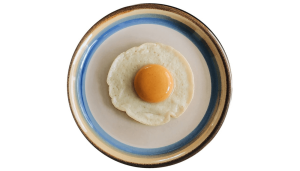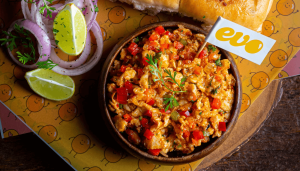Are we the only ones noticing an increase in plant-based eggs news?
Chicken eggs have been a staple in the majority of people’s households for decades. Consumers across all continents use eggs thanks to their adaptability to create innumerous recipes. In 2020, global production of eggs surpassed the previous year by 2.7%, reaching 116M tonnes, and is set to continue expanding. The forecast is to reach 138M tonnes by 2030. China leads global consumption of eggs at 58.6M tonnes in 2020, almost 9 times higher than the US, second-ranked in production and consumption. China is also the first in the world for per capita consumption with 40kg per year per person.
However, this industry that is projected to value $227.39 billion in 2021, does not come without controversies. Truly, consumers’ awareness of the cruelty inflicted on animals in order to achieve these astonishing high production numbers is growing. This increased knowledge of animal cruelty, in addition to other health reasons, is leading people to be more and more curious and adapt to a plant-based diet. We often hear more about meat alternatives, but the egg substitute market is on the rise, expected to reach $1.15bn by 2022. In 2020, the plant-based egg sector was worth $27 million, growing 168 percent from 2019-2020.
Let’s take a look at some of the startups revolutionizing the plant-based egg sector.

Source: Just Egg
Just Egg
When you think about eggs, the first meal that comes to mind is breakfast. This has been the major focus of some plant-based egg startups to be able to enter the market and people’s households.
Just Egg, a product from the Eat Just company, is the catalyzer of the plant-based liquid egg substitute movement. The product consists of a liquid made from the key ingredients mung beans and turmeric, with zero cholesterol, and packed with clean, sustainable protein. It serves as a substitute for scrambled eggs, omelettes, baking, and more. Just Egg’s success is undeniable, becoming one of, if not the most popular brand in the category. In addition, the company also benefited from striking deals with food service company giants such as Sodexo as production and demand increased. Plus, the revolution grows as restaurants fully substitute chicken eggs for Just Egg, such as Chinese fast-food chain Dicos’ 500 locations – which is even more impressive considering the data above mentioning China as the world primary egg consumption country.

Source: Crafty Counter
Crafty Counter
Famous for their plant-based WunderNuggets, Crafty Counter announced in July 2021 their newest creation, WunderEggs. This product is the first whole food plant-based hard-boiled eggs made from nuts offering similar nutrition as eggs minus the cholesterol.

Source: Yo!Egg
Yo!Egg
Yo!Egg is a startup that perfectly simulates the sunny-side-up egg. Their eggs provide the same nutritional value, texture, functionality, and experience only without the cholesterol nor saturated fat.
We recently interviewed the co-founder Eran Groner, read it here.

Source: Float Foods
Float Foods
Another startup dedicated to the development of a plant-based whole egg substitute is Float Foods. The product, OnlyEg, comprises legumes-based substitutes for both egg yolk and egg white as two distinct components. They can be prepared individually or assembled in minutes into multiple styles of eggs including sunny-side-up, over-easy or soft boiled.

Source: Oggs
OGGS
This startup developed a plant-based egg alternative made from aquafaba, the water you find in a chickpea tin. It is perfect for baking, cooking, and snacking. OGGS’s Aquafaba works just like eggs as an ingredient in baking and cooking. It is suitable for hundreds of sweet and savory recipes from sponge cakes and meringues, to mayo, mousses, and more.

Source: Evo Foods
Evo
Evo Foods is using science and technology to create the next generation of plant-based egg substitutes. It’s a plant-powered protein made from moong beans, chickpeas, and peas rich in vitamins B12 & D3, BCAA. The product replicates the delicious & fluffy taste and texture of chicken eggs.
One of the main challenges to creating plant-based eggs is to mimic their versatility. Whether it is fried, boiled, whipped into meringue, blended in a sauce, among many other options, it is difficult to find one magic formula that could achieve all of that.
The plant-based egg sector still has a long way to go until it becomes more of the norm than the alternative; and we are excited to follow its journey.